Madam President,
Sri Lanka notes the report presented by the Special Rapporteur on the right of everyone to the enjoyment of the highest attainable standards of physical and mental health.
The loss of lives and livelihoods and impediments to economic and social development due to the Covid-19 pandemic has exacerbated poverty, inequality and suffering, with serious consequences on the physical and mental health of billions around the world.
Recovery from this pandemic as well as prevention of a resurgence requires equitable access to diagnostics and therapeutics including vaccines, as well as adherence to other preventive measures. Despite early calls by the UN Secretary General and world leaders for international cooperation and solidarity in the response to the pandemic and for Covid-19 products to be considered global public goods, as we speak, millions of people from developing and least developed countries have been left behind due to unequal distribution of vaccines.
Mr. Vice President,
We exercise this right of reply in response to references to Sri Lanka made by the United Kingdom and other speakers during this interactive dialogue.
The proscribed groups referred to in these interventions include organisations linked to the LTTE and other international terrorist groups such as ISIS and Al Qaeda and their regional and Sri Lankan affiliates. They have been listed under the relevant domestic regulations as a part of Sri Lanka’s obligations under UN Security Council Resolution 1373 which has been in operation for almost a decade. The list is based on cogent evidence. It is misleading and unwarranted to characterise action to prevent financing of terrorism and violent extremism as targeting of any particular community or as a hindrance to reconciliation.
Sri Lanka experienced the Easter Sunday suicide bombings in April 2019, which is by far the biggest terrorist attack on a civilian target to take place anywhere in the world. Measures taken by Sri Lanka to prevent recurrence of such terrorist attacks have been taken in the interest of public security and in accordance with the recommendations of the Parliamentary Sectoral Oversight Committee on National Security of 2019/2020. This was a unique national effort which had the participation of Parliamentarians of both the then government and the opposition, representing all ethnic and religious communities in the country. Sri Lanka continues to cooperate with foreign intelligence services including those of the OIC countries, to combat cross border terrorism. Some of the perpetrators of this act of terrorism have already been charged outside Sri Lanka.

Statement by Hon. Foreign Minister of Sri Lanka
Agenda Item 2: Interactive Dialogue on the OHCHR Report ‘Promoting reconciliation, accountability and human rights in Sri Lanka’ (A/HRC/46/20)
24th February 2021
Madam President,
Madam High Commissioner,
Excellencies,
Ladies and gentlemen,
The OHCHR Report which is presented today, emanates from the Resolution 30/1 and 40/1, from which the Government of Sri Lanka announced its withdrawal of co-sponsorship, at the 43rd Session of this Council last year.
Sri Lanka rejects the High Commissioner’s Report which has unjustifiably broadened its scope and mandate further, incorporating many issues of governance and matters that are essentially domestic for any self-respecting, sovereign country. This is in complete violation of Article 2 (7) of the Charter of the UN that states: “Nothing contained in the present Charter shall authorize the United Nations to intervene in matters which are essentially within the domestic jurisdiction of any state…”
The trajectory that has emerged with regard to the recommendations and conclusions reflects the preconceived, politicized and prejudicial agenda which certain elements have relentlessly pursued against Sri Lanka. These recommendations are based on ill-founded allegations.
Sri Lanka categorically rejects the conclusions and recommendations in the High Commissioner’s Report.
The call for asset freezes, travel bans, references to the ICC and the exercise of universal jurisdiction by individual States, based on evidence that up to date has been denied access to and retained by the High Commissioners Office with some of it unreleased for thirty years, particularly in relation to a country like Sri Lanka which has consistently and constructively engaged with the UN and its mechanisms, points to a distinct and eminent danger which the international community as a whole need to take note of. Such unilateral actions by certain countries are unacceptable and a violation of the principles of natural justice.

Madam President,
Madam High Commissioner,
Distinguished Ambassadors,
Ladies and Gentlemen,
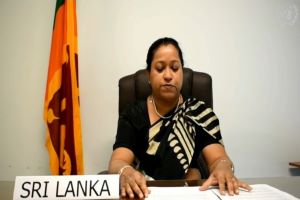
UN Human Rights Council Social Forum 2020
The role of the state and public policies to address poverty and inequalities
09 October 2020
Statement by Sri Lanka
Mr. Co-Chair,
At the outset, Sri Lanka wishes to congratulate the distinguished Permanent Representatives of Azerbaijan and Mongolia who serve as co-chair rapporteurs of the 2020 Social Forum, an annual engagement of this Council to which my country attaches great importance.
As a country whose post-independence national policies have been premised exclusively on the wellbeing of its people, the role of the state and the public policies of Sri Lanka have for long years been oriented in the trajectory of addressing poverty and inequalities among its population.

45th Session of the Human Rights Council
Item 5: Interactive dialogue with the Assistant Secretary General for Human Rights on the report of the Secretary-General on co-operation with the United Nations, its representatives and mechanisms in the field of human rights
30 September 2020
Statement by Sri Lanka
Madam President,
The Government of Sri Lanka (GoSL) wishes to make the following observations with regard to the reference contained in the Annual Report of the Secretary-General on "Cooperation with the United Nations, its representatives and mechanisms in the field of human rights", presented to this Council:
With regard to alleged “intimidating visits”, “surveillance”, complaints of harassment” and “reprisals” referred to in the Report, the GoSL wishes to make an invitation to the parties concerned to make formal complaints to law enforcement authorities or to independent national institutions such as the Human Rights Commission of Sri Lanka or the National Police Commission, so that action can be taken to investigate the alleged incidents.
The Government has already publicly refuted these allegations, and is committed to protecting and promoting freedom of expression and civil society space, and ensure that complaints received on alleged attacks against journalists, human rights defenders and civil society are investigated and prosecuted.
It is also reiterated that, apart from operating routine security networks in the interest of national security, particularly after the devastating Easter Sunday terrorist attacks, the Security Forces and intelligence agencies are not engaged in monitoring any specific group of people in the country.
We believe that, for any country compromising its national security interests amidst looming sophistication of strategies of radical and extreme elements world around, is bound to face regrettable consequences. Hence, the GoSL requests all parties to be mindful of that ground reality in this context.
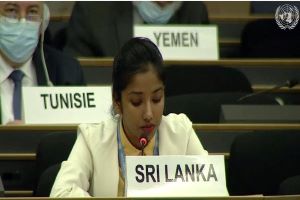
45th Session of the Human Rights Council
Item 7: General Debate on the human rights situation in Palestine and other occupied Arab territories, during the 45th session of the UN Human Rights Council
30 September 2020
Statement by Sri Lanka
Madam President,
Sri Lanka aligns itself with the statement delivered by the Non Aligned Movement.
Sri Lanka’s long held principled position on this matter has been clear. We recognize the legitimate and inalienable right of the people of Palestine to statehood and to the natural resources in their territory. Any form of annexation, irrespective of its size, would constitute a violation of international law, jeopardize prospects for a peaceful settlement to the issue and cause destabilization of peace and security in the Middle East region.
Recent UN reports, including by the Secretary General, have indicated continued human rights violations of the Palestinian people in the OPT. We therefore urge Israel to abandon completely its annexation plans as well as similar activities, and respect the rights of the Palestinian people to fundamental freedoms and security. We echo the expectation of the Secretary General that the recent agreement would lead to an opportunity for re-engagement for constructive and meaningful negotiations to resolve conflict in line with the two-state solution based on relevant UN resolutions and international law.
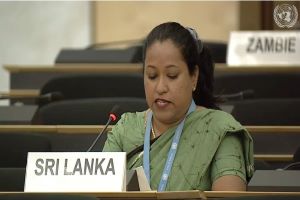
Statement by the Democratic Socialist Republic of Sri Lanka
44th Session of the Human Rights Council
Item 7: ID with SR on Occupied Palestinian Territory
16th July 2020
Madam President,
Sri Lanka takes note of the report presented by Mr. Michael Lynk, Special Rapporteur on the situation of human rights in the Palestinian Territory occupied since 1967.
Sri Lanka associates itself with the statement delivered by Azerbaijan on behalf of the NAM.
We share the concerns raised by the UN Secretary General, the High Commissioner for Human Rights, UN Special Committee to Investigate Israeli Practices and the Special Rapporteur, on the planned annexation by Israel which would constitute a grave breach of international law, including the UN Charter, relevant Conventions as well as Security Council and General Assembly resolutions.
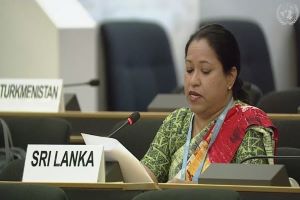
Agenda Item 3: Interactive dialogue with the Special Rapporteur on the rights to freedom of peaceful assembly and of association
09 July 2020
Statement by Sri Lanka
Mr. Vice President,
Sri Lanka thanks Mr. Clément Nyaletsossi Voule, Special Rapporteur on the rights to freedom of peaceful assembly and of association for the report on his visit to Sri Lanka from 18-26 July 2019 (A/HRC/44/50/Add.1). The Government of Sri Lanka shared its comments on the contents of the Special Rapporteur’s advanced unedited report, some of which have been incorporated into the final version that has been presented today. At this interactive dialogue, we wish to share some further comments on matters contained in the report, and provide updates where available.
Mr. Vice President,
As acknowledged by the Special Rapporteur in his Report, the Government of Sri Lanka extended full cooperation and support to the Special Rapporteur “before, during and after the visit, especially given the great difficulties presented at the time”, demonstrating commitment to engage constructively and meaningfully with the Special Rapporteur.
We take note of the recognition in the report, of Sri Lanka’s “particular circumstances as a post-conflict and multi-ethnic society”, and the Special Rapporteur’s condolences to the victims of the Easter Sunday terrorist attacks.
The facilitation of the Special Rapporteur’s visit, even as the country was grappling with challenges associated with a new manifestation of terrorism, demonstrates Sri Lanka’s commitment to continue its constructive engagement with UN human rights mechanisms. The visit of the Special Rapporteur was among the 9 country visits undertaken by Special Procedure Mandate Holders on different thematic mandates to Sri Lanka in the past 5 years, and we remain committed to fostering this cooperative dialogue.

Statement by the Democratic Socialist Republic of Sri Lanka
44th Session of the Human Rights Council
Agenda Item 3: Interactive Dialogue with Special Rapporteur on the human rights of migrants
06 July 2020
Madam President,
Sri Lanka welcomes the report presented by the Special Rapporteur on the human rights of migrants.
The contribution of migrant workers to economic growth and development is increasingly becoming critical not only for their own countries, but also as a catalyst for the upward socio-economic mobility in the region and internationally.
We believe that the COVID-19 crisis taught the world that coordinated and concerted efforts are needed to ensure that migrant health is addressed without discrimination throughout the migration cycle. A further consequence of Covid-19 has been the shrinking of the employment market, which could lead to a serious shortfall in the numbers of migrant workers who will leave for work this year and in turn a drop in worker remittances.
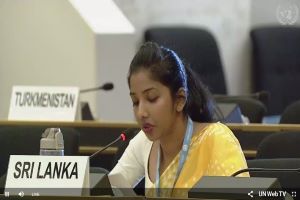
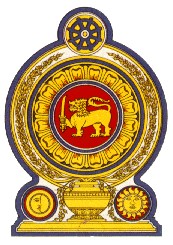
Statement by the Democratic Socialist Republic of Sri Lanka
44th Session of the Human Rights Council
Agenda Item 3: Interactive dialogue with Special Rapporteur on the Right of Everyone to the Enjoyment of the Highest Attainable Standard of Physical and Mental Health
06 July 2020
Madam President,
Sri Lanka welcomes the report presented by the Special Rapporteur on the right of everyone to the enjoyment of the highest attainable standard of physical and mental health. We believe this is timely given that the COVID-19 pandemic is affecting both the physical and mental health of the peoples around the world in an unprecedented manner.
According to WHO statistics, the leading cause of death among young people aged 15-29 has been identified as suicide and most causes are both preventable and treatable. It is distressing that every 40 seconds, someone is dying of suicide somewhere in the world.
It is important to ask what kind of concerns mental health issues cause for humanity and what must be done to address this challenge as we pursue a policy of 'leaving no one behind' in advancing the UN development agenda- 2030, and specially SDG 3 - Good Health and Well-being.

44th Session of the Human Rights Council
Agenda Item 2: Interactive dialogue on the annual report of the High Commissioner
02 July 2020
Statement by Sri Lanka
Madam President,
Sri Lanka welcomes the presentation by the High Commissioner for Human Rights, the Annual Report of her Office for 2019.We appreciate the initiatives taken by the Office to provide technical and financial assistance to States upon request, and highlight the need for equitable geographical representation in the Office. In continuation of our commitment to constructive engagement, Sri Lanka will be making a voluntary contribution of USD 5000 to the Office of the High Commissioner in 2020.
Sri Lanka also notes the oral update provided to this Council by the High Commissioner for Human Rights on Tuesday, on COVID-19 related human rights implications in the world. We welcome the High Commissioner’s request for greater international solidarity in recovering from the pandemic, especially her call to recognize a future COVID-19 vaccine as ‘a global public good’, and the call for easing or suspension of sanctions that hinder pandemic-related relief.
As a country that has guaranteed free universal healthcare to all its people since 1953, through one of the highest per capita health expenditures in its region, Sri Lanka has been able to successfully contain the spread of COVID-19 through a balanced, multi-sectoral approach.
43rd Session of the Human Rights Council
Agenda Item 1 - Urgent Debate on the “current racially inspired human rights violations, systemic racism, police brutality and the violence against peaceful protest”
Statement by the Democratic Socialist Republic of Sri Lanka
17 June 2020
Madam President,
Sri Lanka considers this Urgent Debate on “racially inspired human rights violations, systemic racism and police brutality against people of African descent, and violence against peaceful protest” an important and timely decision by the Human Rights Council (HRC) during its on-going 43rd session. We thank the African Group for proposing this initiative and the members of the Council for endorsing it.
Statement by the Democratic Socialist Republic of Sri Lanka
43rd Session of the Human Rights Council
Item 7: General Debate
15 June 2020
Madam President,
Sri Lanka takes this opportunity to re-iterate its consistent and principled position that the people of Palestine have a legitimate and inalienable right to statehood and to the natural resources in their territory.
In this respect, we take note of the reports presented by the High Commissioner for Human Rights regarding the human rights situation in Palestine and other occupied Arab territories under Agenda Item 7 and express deep concern on, among other matters, the issue pertaining to settlement expansion, particularly the recent decision by the Government of Israel to proceed with the annexation of significant parts of the occupied West Bank. l. We echo the alarm expressed by the Special Rapporteur on the situation of human rights in the Palestinian Territory occupied since 1967 and the UN Special Coordinator for the Middle East Peace Process in this connection, and join international calls to urge the Government of Israel to halt any annexation activities, which would have far reaching and devastating repercussions. As stated in the Communique of the NAM Coordinating Bureau, of 15 May 2020, we note that this would constitute a grave breach of international law, including the UN Charter, relevant conventions as well as Security Council and General Assembly resolutions.
Sri Lanka’s Acting Permanent Representative to the United Nations in Geneva, Dayani Mendis, in a letter addressed to the United Nations High Commissioner for Human Rights, Michelle Bachelet, has raised concerns regarding the allegations made in a press release issued by the High Commissioner on 03 June 2020 regarding “clampdown” of freedom of expression during COVID-19, in which a reference had been made to Sri Lanka.
The letter highlights that it has become essential for all countries and Governments to take measures to counter misinformation and disinformation in the interest of protecting public health, particularly during the COVID-19 pandemic. These measures are also in line with the consensus resolution on COVID-19 response adopted on 18 May 2020 at the 73 World Health Assembly (WHA), which also, inter alia, calls on Member States to provide the population with reliable and comprehensive information on COVID-19 and take measures to counter misinformation and disinformation.

Permanent Mission of Sri Lanka
Geneva
02.03.2020

The Leader of the Sri Lanka delegation to the 43rd Session of the UN Human Rights Council (HRC), Foreign Relations Minister Dinesh Gunawardena met the UN High Commissioner for Human Rights Michelle Bachelet this afternoon (28 February).
Minister Dinesh Gunawardena reiterated the Government of Sri Lanka’s decision to withdraw from co-sponsorship of resolution 40/1 and the basis for doing so. He recalled that, one year ago, his predecessor the former Minister of Foreign Affairs had also pointed out a number of areas in the resolution that were undeliverable. Notwithstanding the withdrawal from co-sponsorship, he emphasized the Government’s commitment to achieving accountability and human rights within the framework of the Constitution towards sustainable peace and reconciliation, through the appointment of a domestic Commission of Inquiry, by implementing policies rooted in the Government’s commitments to operationalize the Sustainable Development Goals (SDGs), and by continuing to work with the assistance of the UN and its agencies. It was noted that the existing reconciliation mechanisms established by Acts of Parliament such as the Office on Missing Persons and the Office for Reparations will be continued, with appropriate adaptation in line with the Government policy framework.
Agenda Item 2 General Debate: Presentation of the written update on the implementation of HRC Resolution 30/1 by the High Commissioner for Human Rights pursuant to HRC resolution 40/1, OHCHR Report on ‘Promoting reconciliation, accountability and human rights in Sri Lanka’ (A/HRC/43/19)
27 February 2020
Statement by Hon. Dinesh Gunawardena, Minister of Foreign Relations, Skills Development, Employment and Labour Relations of Sri Lanka
Madam President,
Madam High Commissioner,
Members of the HRC and Delegates to the 43rd Session of HRC,
Ladies and gentlemen,
As this Council deliberates on the written update presented by the High Commissioner on progress regarding the implementation of HRC Resolution 30/1, I wish to reiterate that Sri Lanka remains committed to engaging with the High Commissioner and her Office in achieving sustainable development, peace and reconciliation, within the national framework overwhelmingly approved by the people of Sri Lanka during the Presidential Election last November, where President Gotabaya Rajapaksa was elected with an overwhelming majority.
Yesterday, the Government of Sri Lanka, at the High Level Segment made clear it’s position with regard to HRC Resolution 30/1, particularly, its decision to withdraw from co-sponsorship of Resolution 40/1 of March 2019, which also incorporates and builds on preceding Resolutions 30/1 of October 2015 and 34/1 of March 2017.

Madam President
Madam High Commissioner
Ladies and gentlemen,
As this Council is aware, in November 2019, the people of Sri Lanka gave a resounding mandate to President Gotabhaya Rajapaksa, to pursue a policy framework aimed at achieving the “four-fold outcome of a productive citizenry; a contented family, a disciplined, a just society and a prosperous nation”[1]. It is envisaged to achieve sustainable development and peace in the country, firmly anchored in safeguarding “national security without compromising the democratic space available to our people”[2].
It was over a decade ago, on 18 May 2009, that Sri Lanka defeated LTTE terrorism militarily, bringing to an end three decades of conflict and suffering. The end of the brutal conflict advanced, secured and protected one of the fundamental human rights – the ‘right to life’ for all Sri Lankans- Sinhalese, Tamil, Muslims and others. I would like to state with pride that since May 2009, not a bullet has been fired in the name of separatist terrorism in Sri Lanka.

Minister of Foreign Relations, Skills Development, Employment and Labour Relations – Dinesh Gunawardena who leads the Sri Lanka delegation to the 43rd Session of the Human Rights Council arrived in Geneva a short while ago.

Ahead of the upcoming 43rd Session of the Human Rights Council (HRC) scheduled to commence next Monday (24 February), Foreign Secretary Ravinatha Aryasinha briefed the President of the HRC Ambassador Elisabeth Tichy-Fisslberger on the decision of the Government of Sri Lanka to withdraw its co-sponsorship of Resolution 40/1 of March 2019 on ‘Promoting reconciliation, accountability and human rights in Sri Lanka’, which also incorporates and builds on preceding Resolutions 30/1 of October 2015 and 34/1 of March 2017.

Speaking at the 2019 Social Forum of the Human Rights Council on 1st October 2019, in Geneva, the delegation of Sri Lanka highlighted the importance of education, a fundamental human right that lies at the core of the 2030 Development Agenda, in the promotion and protection of human rights of children and youth and the transformative power it entails.
At the multi stakeholder meeting, which brought together Government representatives, intergovernmental organizations, civil society and the academia, Ambassador A.L.A. Azeez, Sri Lanka’s Permanent Representative to the UN in Geneva noted that all children and youth have an equal right to an education in a safe and secure setting irrespective of their gender, family income levels, religion, ethnicity, or geographical location and that a hate-free atmosphere that inculcates in children and youth the value of inclusivity and diversity is a crucial element in education that helps build lasting peace and contributes to the strengthening of the social fabric.
Empowering children and youth through access to quality education and ensuring that no child is left behind, is key to achieving sustainable development goals, stressed Ambassador Azeez. He shared Sri Lanka’s experiences in providing education to all and its commitment to promote and protect the right to education for all its citizens as enshrined in Sri Lanka’s laws and regulations.

He added that in order to ensure the special education needs of children with disabilities, 714 schools provide special education through designated units in government schools for disabled children and a special scheme of university admissions for persons with disabilities also exist.
“Such measures have resulted in remarkable social indicators in Sri Lanka in recent years, such as high enrolment rates in education, reduction of school drop-outs and universal primary education reaching 99.7% in 2014” Ambassador Azeez re-iterated.
Permanent Mission of Sri Lanka
Geneva
01 October 2019
Statement delivered by the Delegation of Sri Lanka at the Clustered Interactive Dialogue with the Working Group on enforced or involuntary disappearances during the 42nd Session of the UN Human Rights Council.
Statement English , Sinhala, Tamil
Permanent Mission of Sri Lanka
Geneva
12 September 2019

The Delegation of Sri Lanka to the United Nations and other International Organizations in Geneva delivered a Statement during the General Debate under Agenda Item 2 at the 42nd Session of the Human Rights Council.
The Statement, inter alia, highlighted Sri Lanka’s position on the appointment of the Commander of the Sri Lanka Army expressed on 20th August 2019.
Permanent Mission of Sri Lanka to the UN
Geneva
11 September 2019

Pursuant to the invitation extended by Seine-Saint-Denis, France, and United Cities and Local Governments (UCLG), an organisation based in Barcelona, Ambassador A.L.A. Azeez, as the Chair of the 2018 Social Forum, delivered the key note address at the opening of the ‘International Forum on Olympic Legacy and Social Inclusion’. Inter-linked issues and perspectives relating to sports and human rights, especially in view of Paris Olympics 2024 and other mega sporting platforms, remained the focus. The following is a viewpoint published in the Sunday Observer and Inter Press Service, based on the key note address made by Ambassador Azeez:
News Articles : http://www.sundayobserver.lk/2019/07/28/opinion/%E2%80%98playing%E2%80%99-it-right-path-ahead
http://www.ipsnews.net/2019/07/spirit-olympics-uns-development-agenda/
Permanent Mission of Sri Lanka
Geneva
7th August 2019

The Sri Lanka delegation to the Human Rights Council briefed the Council today on progress made in addressing human rights concerns, national security imperatives, as well as reconciliation priorities. Sri Lanka’s intervention under Agenda Item 2 of the Council, followed the Oral Update provided by the UN High Commissioner for Human Rights Madam Michelle Bachelet at the opening of the 41st Session of the Human Rights Council on 24 June 2019, where a reference was made to Sri Lanka.
Clarifying the latest situation in the Country following the Easter Sunday terrorist attacks and its aftermath, Sri Lanka stated that it has made significant progress in assuring the security of all Sri Lankans and upholding law and order through the implementation of relevant laws and legal processes, among other important measures.
Sri Lanka further asserted that the national institutions in Sri Lanka continued to make interventions on issues pertaining to violence and extremism, as the Government pursued effective measures that have led to the dismantling of terrorist networks in the Country.
Statement is attached.
Permanent Mission of Sri Lanka to the UN
Geneva
25 June 2019